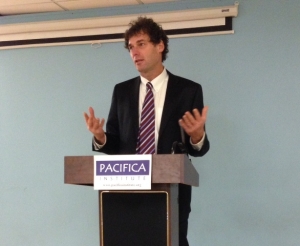As part of its dynamic and intellectual luncheon forum series, the Pacifica Institute hosted Rob Eshman, editor-in-chief for the Jewish Journal, on Thursday, November 21, 2013. Given his successful career in the more often than not neglected field of ethnic journalism, Mr. Eshman spoke to the guests and listeners about ‘Journalism in a Diverse Society: The Los Angeles Case’. “This is something that I feel very strongly about yet I feel it does get enough credit,” noted Mr. Eshman as he began his talk.
Relating back to an advice given by a college professor of journalism that “life is short, so do something with meaning,” Eshman recalled that back then in college, he would never have believed that he would one day become the editor-in-chief of an ethnic newspaper such as the Jewish Journal. In those days ethnic journalism had a bad reputation, it didn’t seem so meaningful to me then, but when I got the opportunity to cover the story of a 14-year-old boy living in İsrael, in need of a partial lung transplant that could only be done in Los Angeles, and I got to see how the whole community got together to help this boy and his family come to Los Angeles, to find jobs for the parents, to put the kids in school and to make it possible for this boy to be treated in the hospital, I was amazed with the value and power of community, Eshman explained as he walked the listeners through his transition into becoming a passionate participant in ethnic journalism.
“Community saves lives, community strengthens lives, community ennobles lives…” Eshman commented and continued on to speak about the role of a community paper in strengthening a community, bringing the people together and upgrading the greater society surrounding the community. Mr. Rob Eshman also spoke about the changing role of ethnic journalism throughout its course in history. Back when the immigrants had first started coming in to the US, the role of the community paper was to make the people into Americans, whereas, nowadays that role has changed into helping the Americans get back in touch with their roots and their original identities, he explained. In today’s world, ethnic stories have become critical to both national and international stories as people build communities through their ethnic ties, commented Eshman, underlining the importance of ethnic journalism once again.
In a time when major newspapers are disappearing and there is not enough of a thriving journalism market, the existing newspapers do not have enough time and space to cover every story. That is where ethnic media comes in. Community newspapers have a crucial role in filling that void, noted Eshman. With community newspapers, you are able to directly speak to the community and engage them in civic life. You are able to speak about the concerns of the society, Eshman continued, as he presented an example of a Chinese community, which relied on this ethnic media to communicate within each other and find shelter from the approaching Hurricane Sandy at the time. Another crucial role that ethnic journalism plays is taking your own community out into world and being able to listen to their points of view, their concerns, commented Eshman while also adding the fact that through such a medium you are able to provide a community for the people. The two things that people want most in life is meaning and connection, and with that connection hardships are made bearable because you know that you are not going to have to face it alone.
As Rob Eshman neared the end of his talk, he spent some time talking about a few pointers to keep in mind when engaging in ethnic journalism. First of all, you have to be independent to be able to provide objective and true journalism, he said. Being financially viable, being interactive and responsive and as inclusive as possible while listening to the feedback of others, being good in journalism, weighing and verifying the facts and keeping the quality of your story-telling top notch were a few pieces of the advice that Eshman provided. All in all, our concern is to contribute to society and build a strong community where everyone can find the strength to fight for the values that constitute their identity, noted Mr. Eshman as he finished his talk and opened up for an interactive session of Q&A with the participants.
A light lunch served afterwards with continued conversation wrapped up the day’s session before everyone went back to their daily schedules.

